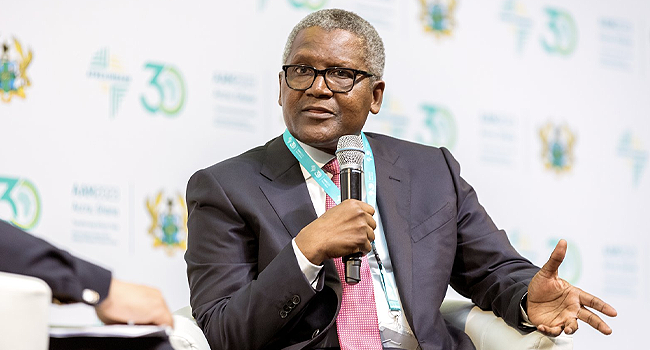President of Dangote Industries Limited, Aliko Dangote, has rejected claims that his companies monopolise key sectors of Nigeria’s economy.
Defending his business model, he insisted that Africa must embrace industrialisation and avoid becoming a dumping ground for foreign goods.
For years, critics have accused the Dangote Group of exploiting dominance to shut out rivals — scrutiny that has grown since the launch of its $20 billion oil refinery. But Dangote maintains that his success stems from strategic investment and entrepreneurship rather than state favours or restrictive policies.
A Bloomberg feature on Thursday noted that some of Dangote’s biggest gains came in sectors where imports were banned or restricted, such as sugar and cement. It recalled a 2007 cable from then-US Consul General Brian Browne, later published by WikiLeaks, which accused Dangote of tilting the playing field in his favour.
Dangote countered that the products in question were not banned at the time and argued he merely seized opportunities others ignored. “If you are going to call first movers into business monopolists, then you will never establish a manufacturing base, or anything you can call a country,” he said.
Reflecting on the refinery, Dangote admitted the strain of building it in a country with weak public services. “From the start, we realised nobody could provide us with any service. You have to provide almost everything yourself,” he said, adding, “If I knew what I was going to go through, I wouldn’t have tried it.”
According to the Bloomberg Billionaires Index, Dangote’s net worth has risen by about $1 billion in the past three months to $28 billion, boosted by the refinery’s operations, which have turned Nigeria into a net exporter of petroleum products for the first time in 30 years.
He denied any wrongdoing, including preferential access to foreign exchange, stressing: “We have made our money clean. We are not part of corruption; we are part of the problem-solving.”
Dangote Industries stated it remains at the forefront of Nigeria’s industrialisation. Vice President Devakumar Edwin said the refinery would transform the economy: “Instead of exporting raw material, we are exporting the value product.”
In September 2024, the company sought a Federal High Court injunction to halt oil imports, arguing the refinery could meet domestic demand. The suit — filed against NNPC Ltd., the downstream regulator, and oil firms — drew criticism as potentially fostering monopoly. Dangote Industries withdrew the case in July 2025, opting for an out-of-court resolution.
Edwin later stressed the need to shield domestic industries, comparing Nigeria’s approach to that of the US and China: “These governments protect their industries. All we are saying is, ‘Do the same.’ Otherwise, we will keep exporting raw materials, adding to somebody else’s GDP, and creating jobs abroad.”



